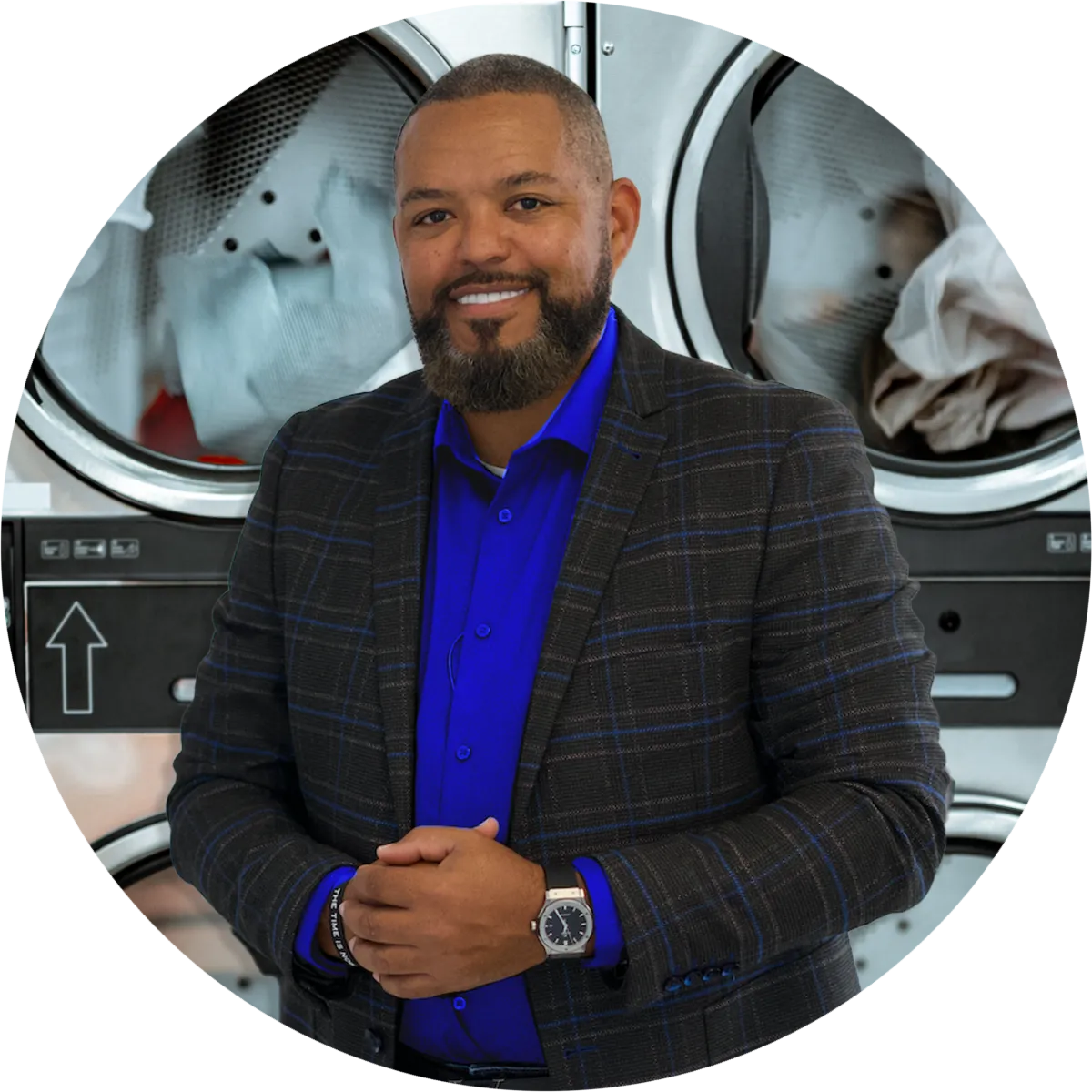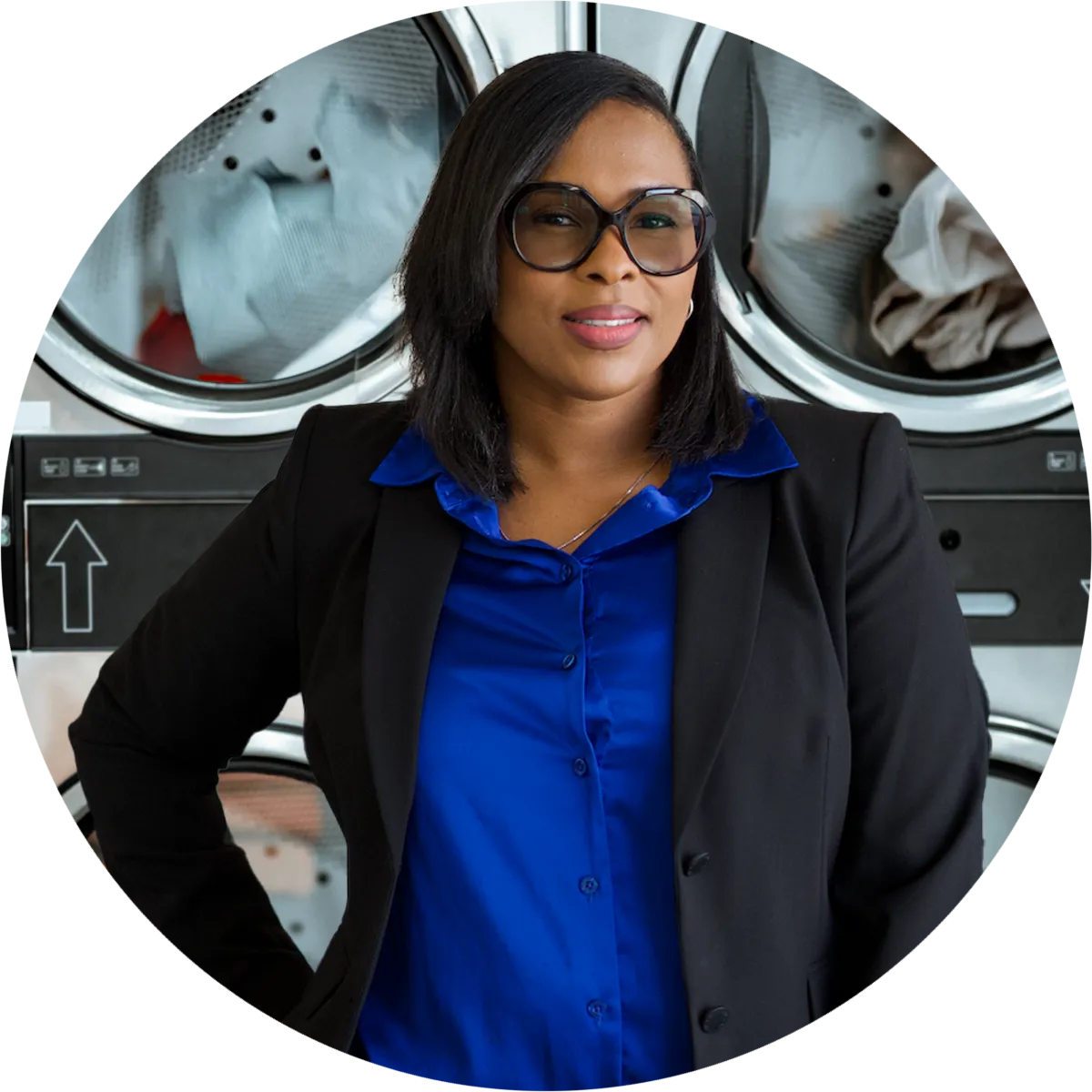
Transforming Change into Wealth
Learn How Change, Can Change Your Life


Meet Joe and Lisa Ebanks - Your Laundromat Investment Partners
While everyone else was chasing shiny object investments and get-rich-quick schemes, Joe and Lisa Ebanks were quietly building their empire… one quarter at a time.
These two didn’t start with trust funds or fancy MBA degrees. They started with a simple realization: people will always need clean clothes, no matter what the economy does. So while others were flipping houses and day-trading crypto, Joe and Lisa were scooping up cash-flowing laundromats that most “sophisticated” investors completely ignored.
Their mission with Wealth Off Washers?
Show regular people how to build real wealth through the most recession-proof business on the planet. No hype, no BS – just proven strategies that actually work. Joe brings the numbers and systems (the guy can spot a bad deal from a mile away), while Lisa handles the operation side and community building (she’s the one who’ll keep you motivated when things get tough). Together, they’ve cracked the code on laundromat investing and now they’re sharing everything they’ve learned.
The best part?
They’re still in the trenches, actively buying and operating laundromats. This isn’t some theoretical course from people who “used to” invest. Joe and Lisa are building their empire right alongside their students, proving that their methods work in today’s market.
Bottom line: If you’re tired of complicated investment strategies that require you to be a genius, Joe and Lisa have something better. Real businesses, real cash flow, real results.
Introducing
Our Wealth Building Services

Wealth off Washers Course
Tired of “someday” success?
Ready for real, weekly cash flow?
$12,387 Value
Launch Price: Only $997 Today
A→Z Laundromat Acquisition Program
Ai Laundromat Sniper
Lead Engine Database
Contracts, Scripts, & Templates Vault
Monthly Deal Coaching (1 Year)
Creative Finance Negotiation Pack
Growth Plug-Ins Toolkit
AI Owner Outreach Agent
and many more!

Wealth Off Washers Masterclass!
Step by step guide to learn how change, can change your life #laundromat
In-Depth Exploration
Free Live Class
How to talk to aging laundromat owners so they actually WANT to finance you
Future-Proofing Your Investment
How AI handles the uncomfortable parts (outreach, qualifying, booking)
$0, Totally free!
Other services
Laundromat Quick Clarity Call
(15–25 minutes)
Investment: $97
Perfect for: New or curious buyers who need fast direction
What you get:
This short session is designed to give you clarity and momentum. Whether you’re unsure where to start, have a quick deal question, or want to know what your next move should be — you’ll leave with 1–2 clear action steps tailored to your situation.
This is not a deep strategy call, but it’s powerful if you need help getting unstuck or pointed in the right direction.
Strategy Session
(45–60 minutes)
Investment: $297
Perfect for: Serious buyers ready to approach a seller, analyze a deal, or structure a creative offer
What you get:
This in-depth call is where we roll up our sleeves. Bring your deal, seller conversation, or offer idea — and I’ll help you refine it, structure the numbers, and make sure it’s a smart, win-win deal.
You’ll walk away with:
A clear, custom strategy for your deal or market
Confidence to negotiate with the seller
A next-step action plan you can implement immediately
This call can save you thousands and fast-track your first laundromat purchase.
Why Choose Us?
📚
Education & Empowerment
Easy-to-follow resources & training
🔍
Transparency & Integrity
Clear, honest guidance
⚙️
Innovative & Profitable
Latest strategies & tools
👥
Supportive Community
Join a network of like-minded investors
🎯
Personalized Approach
Tailored to your unique goals
🤝
Long-Term Partnership
Build wealth for generations
Testimonials
Maria S.
"Joining Wealth Off Washers gave me the courage to take control of my financial future. As a single mom, I was looking for something stable yet scalable.
My first laundromat turned into two in just 11 months. The community is incredible—we lift each other up and celebrate wins together."
David R.
"I never thought owning a laundromat could replace my 9-to-5, but WOW proved me wrong. The step-by-step coaching from Joe and Lisa was priceless. Their focus on ethics and transparency made me feel safe every step of the way.
I now earn clean profits from my clean business—and finally have time for my family."
Samantha V.
"Before WOW, I thought investing was only for the wealthy. But Joe and Lisa showed me that with good credit and a solid plan, you can own a cash-flowing business. Their no-cutting-corners mentality made me feel confident.
I now mentor other women looking to do the same!"
Frequently Asked Questions
What exactly is this course about?
The Laundromat Blueprint is a step-by-step course that shows you how to buy your first laundromat using owner financing — even if you don’t have hundreds of thousands saved or perfect credit. You'll learn how to find deals, structure creative offers, and close with confidence.
Do I need a lot of money to get started?
Nope. This course is designed to help you leverage creative strategies like seller financing, which often means low upfront cash and no traditional bank loans. We show you how to structure deals smartly — even if you’re starting with limited capital.
What if I have bad credit or no experience?
That’s exactly why this course exists. Traditional lenders may care about your credit score, but many laundromat owners will finance you directly if you make the right offer. We teach you how to position yourself as a credible buyer, no matter your background.
Who is this course for?
This course is perfect for professionals, entrepreneurs, or side hustlers who want to build cash flow without tenants, toilets, or tech. If you want a recession-resistant, real-world business with freedom potential — this is for you.
How long will it take me to buy my first laundromat?
Most of our students take action within 30 to 90 days — depending on how much time you commit.
Do you cover owner financing in depth?
Yes — this is the core of the course. You’ll get plug-and-play scripts, offer templates, seller conversation guides.
What if there are no laundromats for sale near me?
We show you exactly how to find off-market deals, connect with retiring owners, and even use Facebook and Craigslist to uncover hidden gems. You don’t need to rely on BizBuySell or brokers.
Will I learn how to run the laundromat after I buy it?
Yes. We include a module on how to operate your laundromat in the first 30 days.
Is this course beginner-friendly?
Absolutely. You don’t need prior business experience or real estate knowledge. We break everything down into simple steps — even if you’re starting from scratch.
Do I get lifetime access and updates?
Yes! Once you enroll, you’ll get lifetime access to the full course and any future updates we add. This is a resource you can come back to again and again as you grow.

COMPANY
CUSTOMER CARE
LEGAL
FOLLOW US
Copyright 2026. Wealth Off Washers. All Rights Reserved.